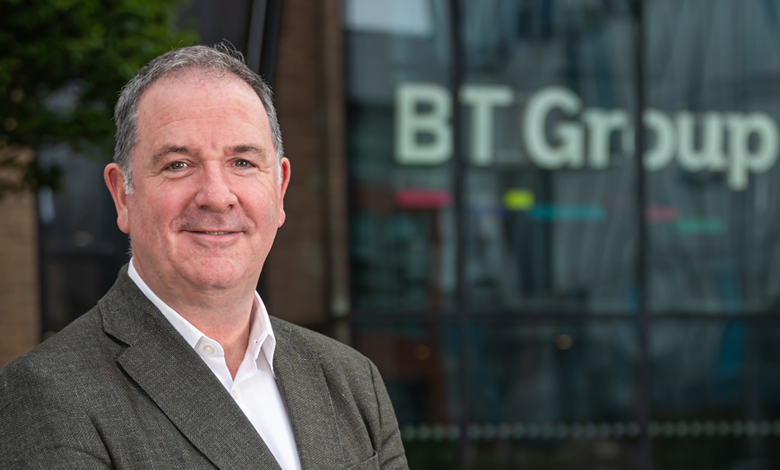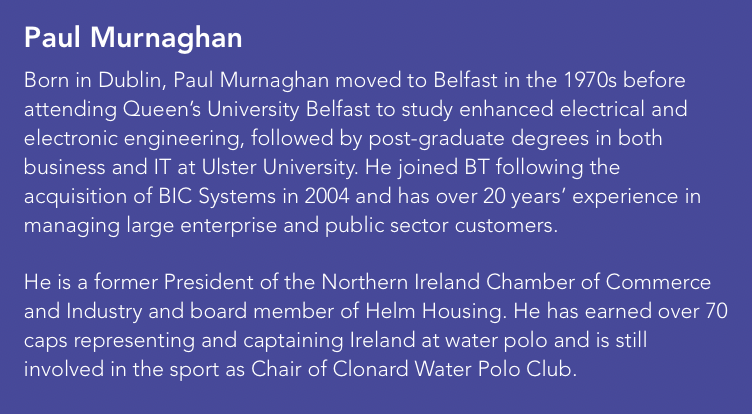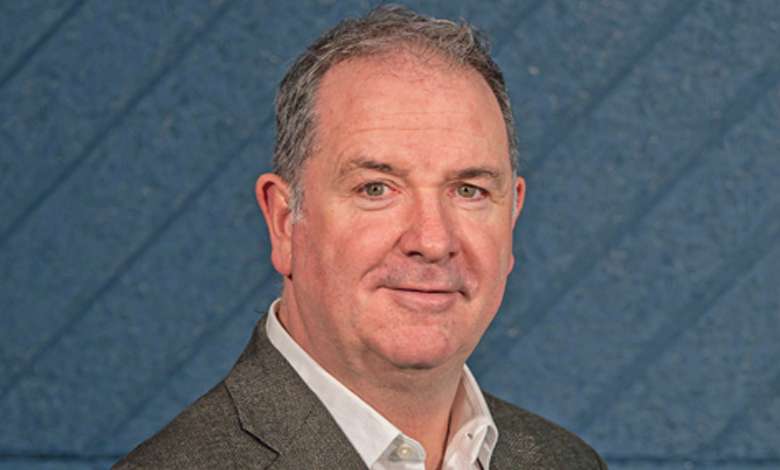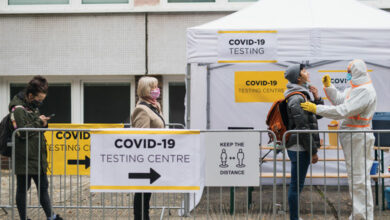Connecting for the future

Paul Murnaghan, Regional Director for BT in Northern Ireland, talks to David Whelan about the organisation’s transition from telco to techco, and its ambition to help transform the local economy.
Murnaghan is steadfast in his opinion that not only is BT good for Northern Ireland’s economy, but Northern Ireland’s economy is good for BT.
A global company with a local focus, Murnaghan explains that BT puts the needs of the public and private sector in Northern Ireland at the heart of its work, while offering the fastest and most reliable connectivity.
Speaking from the newly refurbished Riverside Tower in Belfast, one of the strategic locations across the UK chosen by BT Group as part of its large workplace and consolidation scheme, the Regional Director explains that the multi-million pound investment is a reaffirmation of the company’s commitment to Northern Ireland.
Home to around 2,000 staff from BT Group – which includes EE, BT Business, and Openreach – the building has been radically modernised while retaining its legacy as a dominant feature in the Belfast skyline over the past two and a half decades.
“We are very proud of our legacy as a long-term private sector investor in Northern Ireland, even in times when there were very few. I think that legacy is recognised and continues to serve us well today,” explains Murnaghan.
“Whether it is helping to transform communities through our public sector contracts, connecting businesses of all shapes and sizes, or installing the latest mobile technology for the future, we are at the core of Northern Ireland’s digital future and infrastructure.
“BT has been good for Northern Ireland, but Northern Ireland has also been good for BT. Everyone who lives and works here reaps the social and economic benefits of being at the forefront of the digital revolution.”
The impact of the UK’s largest telecommunications company on Northern Ireland’s economy is evident.
A recent report by the consultancy firm Hatch estimated that BT contributed an estimated £420 million to Northern Ireland’s economy during the 2021/22 financial year, rising to £690 million when employee and supply chain spending was factored in.
Highlighting the company’s broad range of activities across the UK, supported by 7,340 jobs in Northern Ireland, Murnaghan explains that over half of BT Group employees here are sustained by work outside of Northern Ireland. This reinforces BT’s commitment to the region as a good place to do business in, but also to do business from
“As a region of just under two million people, Northern Ireland is small enough to ensure speed and agility, whilst also large enough to scale, and with a trusted maturity of engagement with our customers, it gives us the flexibility to test new solutions in a safe and accelerated way.”
Paul Murnaghan, Regional Director for BT in Northern Ireland.
Solutions
Commenting on how BT has been able to retain such a large market share of private and public sector clients in Northern Ireland, Murnaghan points to the organisation’s ambitions to constantly evolve to ensure it is meeting not only the needs of its customers, but also those of its customers’ customers.
Underpinning the organisation’s solutions-led transition from a telco to a techco, he states, is record investment in next generation networks, such as full fibre broadband via Openreach and 5G via its mobile network EE.
Openreach’s investment in full fibre rollout in Northern Ireland means that over 85 per cent of premises in the region have now been passed, and Murnaghan says that upgrades to Northern Ireland’s digital infrastructure “will support the region’s economic growth ambitions and ensure Northern Ireland’s businesses and public sector organisations are able to take full advantage of the latest technologies and digital possibilities”.
Connectivity
That Northern Ireland “punches well above its weight” in relation to underpinning connectivity is the basis for the Regional Director’s outlook that the Northern Ireland has been, and can continue to be, the ‘Goldilocks’ region for BT’s ambitions.
Explaining the turn of phrase, he says: “As a region of just under two million people, Northern Ireland is small enough to ensure speed and agility, whilst also large enough to scale, and with a trusted maturity of engagement with our customers, it gives us the flexibility to test new solutions in a safe and accelerated way.”
One such example of this is BT Group’s decision to place Northern Ireland as one of the earliest regions for switching customers to their new digital (Voice) home phone service. While Murnaghan explains that most business customers in Northern Ireland have already been switched, the wider rollout in Northern Ireland will ensure the long-term connectivity needs of consumers are met through future-proof digital technology and full fibre networks.
Expanding further on the use of Northern Ireland as a sandbox for trialling BT’s advanced solutions, the Regional Director also highlights an ongoing partnership between BT and Belfast Harbour which will deliver a series of 5G-led innovations to accelerate Belfast Harbour’s digital transformation and help deliver its smart port strategic ambitions.
Working as the Harbour’s technology partner, the Regional Director says that BT is building 5G-led innovations to unlock the productivity benefits for the port and contribute to the region’s green recovery ambitions.
“Our UK-and-Ireland-first 5G trial with Belfast Harbour in 2019 was a powerful illustration of how 5G-led technology can transform the port’s operations, propel the success of local businesses, and drive economic growth. The collaboration with Belfast Harbour will make these benefits a reality, with the creation of a sophisticated digital ecosystem comprising of 5G as well as other emerging technologies such as AI, IoT and connected vehicles. This digital fabric will act as a springboard for Belfast Harbour to achieve its ambition to be the world’s best regional smart port and a leading innovation hub for the region,” says Murnaghan.
In January 2023, Belfast Harbour announced that, along with BT and a consortium of partners, it is set to deliver one of the first fully driverless transport systems anywhere in the UK. The automated passenger shuttle service, providing last mile connectivity in the Harbour Estate from the Titanic Quarter railway station to Thompson Dock on Queen’s Island. Murnaghan outlines how the project is a prime example of how BT’s connectivity expertise is being leveraged to drive solution-led advancements across various sectors.
Elaborating on how BT’s reach extends far beyond connectivity of fixed, mobile, and broadband connectivity, the Regional Director points to influence in other areas ranging from the public sector in the form of transport and logistics, healthcare and education, through to identified key economic enabling sectors such as advanced manufacturing and agri-food, as examples of the size of BT’s economic footprint and transformative power.
Healthcare
Emphasising BT’s ambition to ‘Connect For Good’, becoming the world’s most trusted connecter of people, devices, and machines, Murnaghan highlights that BT has invested heavily in the healthcare market, recognising the need for transformation of the region’s healthcare system.
“There is a long-standing acknowledgement of the need for transformation across the NHS and specifically in the healthcare sector in Northern Ireland. Our belief is that that transformation can happen quicker and better if underpinned by the connectivity opportunities that we are advancing.
“Our aim is to supercharge anticipatory care, alleviate system pressures, improve efficiency and improve the experience of delivering for the people that look after our friends and family.”
Murnaghan explains that BT’s ambition is to work together with clinicians to build smarter, safer, and more efficient services for everyone. “Our ‘clinically led, digitally enabled’ strategy sees BT work closely with the NHS and other healthcare providers from the first conversation, right through to tests and trials and rolling transformative technology out across the front line.
“Utilising connectivity available at home and integrating technology into the patient journey can not only enable more care in the community and reduce hospital presentations, but can also be more effective in preventing healthcare emergencies and ultimately, reducing cost,” the Regional Director explains.
In a similar vein, BT connects all schools across Northern Ireland as part of its wider remit to provide industry leading telecommunications services to all public sector bodies across Northern Ireland, through the Public Sector Shared Network (NI PSSN) contract. In May 2023, it was announced that the Education Authority had partnered with BT to bring state-of-the-art internet access to all schools across Northern Ireland under the Education Information Solutions Programme (EdIS).
Enhanced wireless connectivity throughout all teaching and learning areas with the installation of over 24,000 new wireless access points is IT supplier’s Cisco Meraki’s largest WiFi deployment in Europe.
Murnaghan explains that BT is very proud to be part of the project that will enable every child in Northern Ireland to have equal access to technology in the classroom regardless of geographical location or socio-economic background.
Innovation
While BT is cognisant of the impact of its investment in Northern Ireland’s economic future, Murnaghan stresses that the organisation will not rest on its laurels. The BT Ireland Innovation Centre, a major project delivered in partnership with Invest NI and Ulster University is at the intersection of advancing artificial intelligence, the Internet of Things (IoT) and cyber security, for future secure connectivity solutions.
Meanwhile, Murnaghan says that collaboration between BT and Northern Ireland’s leading universities and further education colleges has been fruitful in ensuring not only strong progress in research and development, but a partnership approach to skills development and career creation.
BT in Northern Ireland is currently filling 55 roles for September 2023 with an intake of graduates and apprenticeships. Additionally, earlier this year the firm announced 100 new digital jobs as part of its expansion in the city, a figure Murnaghan believes can grow significantly if increased capacity becomes available across graduates, apprentices and experienced hires.
Creating key career pathways will be critical as BT, like many other large organisations globally, constantly compete for talent. Describing how BT is working to attract and retain talent in Northern Ireland, the Regional Director says that another major tool is BT’s focus on workforce diversity.
“In the last number of years, we as an organisation have acknowledged the existence of a more values-driven labour market. We recognise that if we want to attract the best talent to work for BT then having the right values in place is critically important. One of the key pillars of our focus has been creating a more diverse workforce, acknowledging that greater diversity generates a more challenging, and ultimately healthier, approach to our thinking and our output.”
Security
Underpinning BT’s future ambitions as the trusted technology partner of both private and public sector innovators in Northern Ireland is security. In October 2022, BT officially opened its state-of-the art cyber Security Operations Centre (SOC) within the flagship Riverside Tower building.
The 40-seat centre of excellence will provide 24/7 management 365 days a year for ICT assets across the Northern Ireland Civil Service and support growth in BT’s UK customer base providing the highest levels of security classification.
“Each day, millions of people around the world rely on BT’s expertise in cybersecurity to ensure they can go about their lives and run their businesses safely,” explains Murnaghan.
“With the scale and complexity of cyberattacks constantly increasing, organisations of all types are looking to ensure they have the right protections in place. The SOC will leverage BT’s global security expertise and leading cyber technologies to defend public and private sector bodies against the latest threats.”
Vision
Discussing his vision for BT in the future Northern Ireland economy, the Regional Director says: “BT is vested in Northern Ireland because we see great opportunity here. We want to realise the progress that the ‘Goldilocks’ ambition provides because it is an exciting prospect for BT, for the region and for everyone who lives and does business here.
“To ensure we reach these ambitions, we must overcome several challenges, one of which is a lack of political and policy certainty, which is a barrier to attracting investment. Our second challenge, and one which we are striving to meet head on, is ensuring that we are constantly evolving to meet the needs of our customers beyond what we currently offer. This challenge is potentially the most exciting prospect because it is about attaining an intrinsic knowledge of the needs of our customers and of their customers.
“Given the scale and breadth of our customer base here in Northern Ireland and assessing the region’s goals and ambitions, I have no doubt that our future solutions can help bring transformative change to this region as a whole.”








